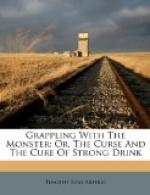In many parts of England and Scotland there is local prohibition, and the uniform testimony as to the absence of pauperism and crime is as unequivocal as that given above.
THE MAINE LAW—ITS COMPLETE VINDICATION.
But it is to the State of Maine, where a prohibitory law has existed for over a quarter of a century, and where prohibition has been put to the severest tests, that we must look for the more decisive proofs of success or failure.
On the evidence which Maine furnishes, the advocates of legal suppression are content to rest their case. In order to get a brief, but thoroughly accurate and reliable history of the Maine law, we addressed a letter to Hon. Neal Dow, of Portland, Maine, asking him to furnish us, for this volume, with the facts and evidence by which our readers could for themselves judge whether the law were a dead letter, as some asserted, or effective and salutory. In reply, Mr. Dow has kindly furnished us with the following deeply interesting and important communication:
TESTIMONY OF HON. NEAL DOW.
PORTLAND, October 12th, 1877.
T.S. ARTHUR, ESQ.:
Dear Sir—I will gladly furnish you with a brief history of the Maine Law, and a statement of its operation and effects in Maine, in the hope that the wide circulation of the work you have in preparation may serve to correct the mistaken notion that prevails, to the effect that the law has failed of any useful result, and that the liquor traffic is carried on as extensively in Maine as ever it had been, with all its baleful effects upon the moral and material interests of the State.
In the old time the people of Maine were as much addicted to the use of strong drinks as those of any other part of the country; and the effects of this shocking habit were seen everywhere in shabby buildings, neglected farms and in wide-spread poverty. There were, in this State, magnificent forests of the best pine timber in the world. The manufacture of this timber into “lumber” of various descriptions, and the sale of it, were the leading industries of Maine. The products of our vast forests were sent chiefly to the West India Islands, and the returns were mostly in rum and in molasses, to be converted into rum by our own distilleries, of which there were many among us, in various parts of the State—seven of them in this city, running night and day. This rum, almost the whole of it, whether imported or home-made, was consumed among our own people. It was sent in the way of trade and in exchange for “lumber” into every part of our territory; not a town or village, or rural district escaped, however remote or thinly populated it might be.
The result of this was, that almost the entire value of all this vast industry went down the throats of our people in the shape of rum,




